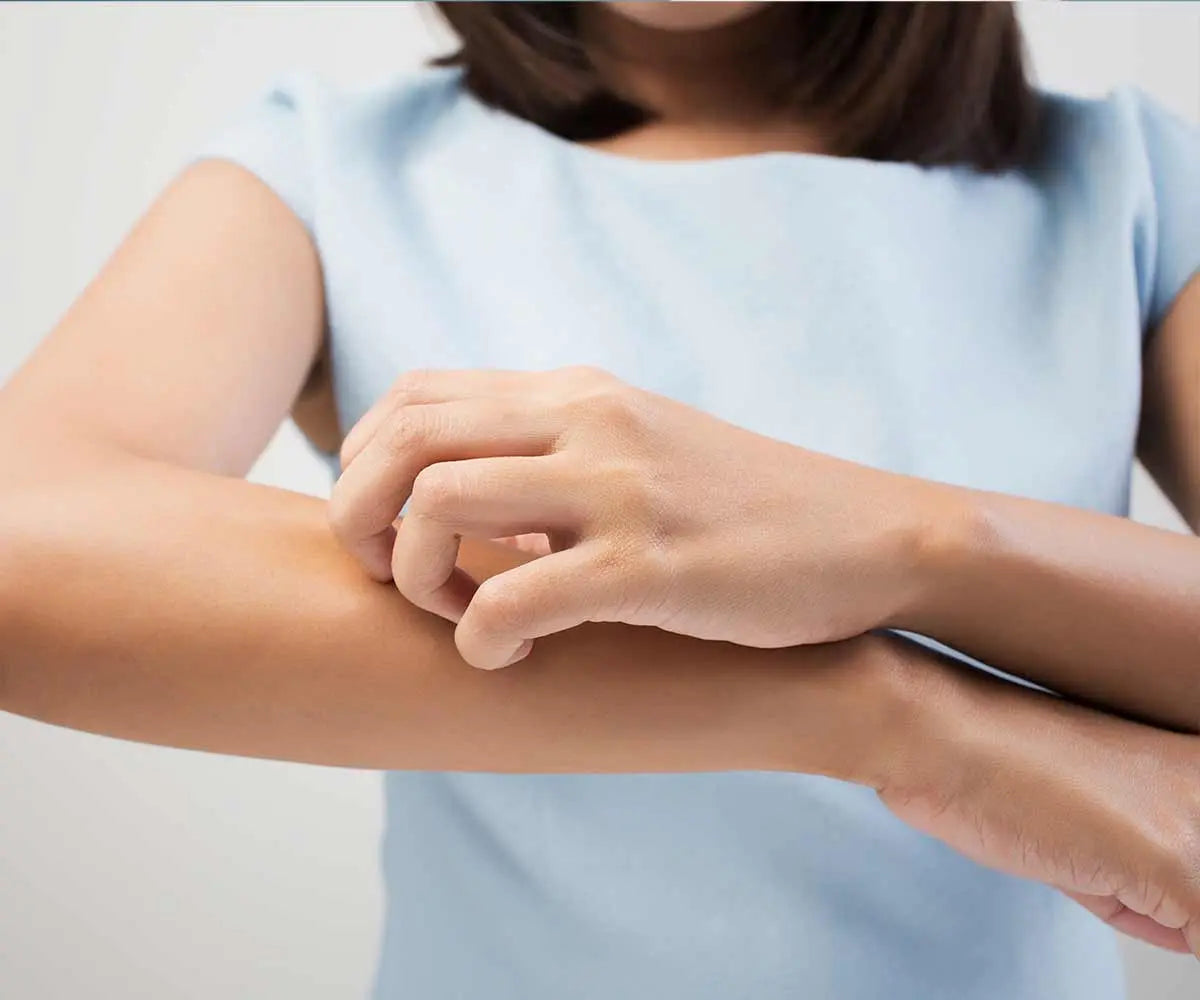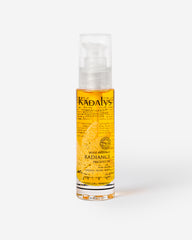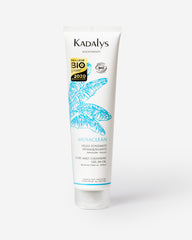
Eczema: definition, causes & symptoms
Beyond the different skin types that we all already know: dry skin, oily skin, combination skin, mature skin, ... There are also slightly less well-known skin conditions that can affect all skin types! Among the most common: dull or tired complexion, dehydrated or stressed skin, or skin prone to eczema. This latter skin condition is also known as atopic dermatitis. Like all skin conditions, it can be adjusted with simple gestures and natural cosmetics. For more advanced cases of eczema, cortisone creams can relieve uncomfortable itchy episodes. We explain everything about what eczema is, how to relieve the skin and how to avoid it!
What is eczema?
Eczema is a skin disease also known as “atopic dermatitis”. It can affect all skin types and all ages! Symptom level, it is often detected by patches of dryness or redness on the skin. These plaques are outward signs of inflammation of the epidermis. They are often accompanied by a feeling of strong itching. As always with skin problems like this (acne pimples, mosquito pimples or chickenpox), we know that they should not be touched for the inflammation to subside faster and on its own. And we also know that it is not easy! However, not scratching helps prevent the potential development of viruses or bacteria that would only make things worse ...
In babies, forms of eczema are often found in the skin folds and the breech. In adults, eczema patches can be found all over the body.
The different forms of eczema
We don't necessarily know it, but all eczemas are not the same!
The most famous of all is atopic eczema. It is often genetic and people who are prone to it will remain so for the rest of their lives. Eczema flares can happen at any time and are often related to allergies. The most famous allergens are dust or pollen.
Contact eczema is also linked to an allergen. It can happen almost overnight, like an allergy!
Secondary eczema is triggered by a bad reaction after applying an expired cosmetic, for example.
Photosensitizing eczema is related to the sun. If you apply photosensitizing products before exposure to the sun, your skin may find it hard to live! Remember to apply sunscreen as soon as the first rays appear.
Seborrheic eczema affects the skull. Not to be confused with sensitive scalps and dandruff! Seborrheic eczema is distinguished by the small yellow scabs that it causes. Most of the time it is due to stress. Of course, this list is not exhaustive! You can also be affected by different forms of eczema at the same time.
How do you recognize eczema? What are the symptoms ?
Eczema often results in red patches which in turn indicate inflammation of the skin. These red patches are accompanied by unbearable itching and a great feeling of discomfort. For the little ones, it is very difficult to manage eczema flare-ups. Therefore, they are often accompanied by crying!
Eczema can come in many different forms and flare-ups follow but are not the same.
itchy eczema red patches
It can be dry eczema, which results in very dry patches on the skin that are extremely itchy. These plaques cause the skin to peel: small pieces of skin fall off on their own.
It can also appear as small patches, no larger than coins all over the body.
It can also cause fluid-filled blisters on the skin. Eczema can also look like small cracks.
Symptoms can last one to two weeks. If an infection occurs as a result of the scratchings, you may develop a fever. In any case, if the plaques do not decrease or if you feel that something is not going as usual, see your doctor.
What causes eczema?
Eczema can simply be genetic. If one of your parents or loved ones in the family is prone to this skin disease, you are likely to be too. In this case, you can prevent breakouts by using cosmetics as natural as possible. Putting aside silicones, alcohol, parabens or sulphate-type surfactants can only do your skin good! Also avoid taking baths that are too hot or doing hammams for example. Your skin is undoubtedly very sensitive and reactive.
Eczema can also be caused by ingredients that are a little too harsh in the ingredients. Vosmetic, in detergents or softeners.
States of great stress can also cause skin reactions! In people who are anxious or stressed by nature, it is not uncommon to see patches of irritation appear before exams or interviews.
Allergens are also a factor in atopic dermatitis. The most likely to trigger flare-ups are dust, animal hair, mites, pollen, and mold!
In young children still wearing diapers, the friction of the diapers can also cause them small patches. The maceration in the layer is also a factor to take into account. Young children, especially newborns, have fragile, thin skin. During the first months of their life, it is not necessary to bathe them every day. As the water is very hard, a bath two to three times a week at most is sufficient! A little extra tip: when you are about to wash a child (baby or older) with sensitive skin, pour a few drops of vegetable oil in the bath. The water will only be softer and their skin protected! Also valid for adults.
What foods can cause eczema?
And yes, you read correctly ! Some foods are also allergenic! So what are the ingredients most likely to trigger atopic dermatitis?
In first position: oleaginous fruits. These are peanuts, tree nuts and seeds. These foods are very allergenic, and they are introduced quite late in the diet of the little ones to avoid unpleasant surprises!
Dairy products are notorious for being poorly digested. Well in some cases, they can cause skin reactions! Ditto for molluscs or crustaceans.
Last ingredient highlighted: chocolate! Although not everyone is crazy about chocolate, we don't know you, but we wouldn't like to be allergic to it!
If you notice skin reactions, however small, after ingesting any of their foods, be sure to consult an allergist to perform some tests.
We hope we have shed some light on the subject of atopic dermatitis. Fortunately, there are natural solutions to calm and treat eczema. Bananas naturally contain soothing and restorative molecules. The yellow banana oil, which is found in our Precious Organic Radiance Oil, helps calm irritation, nourishes and repairs patches of dryness. The organic lip balm, rich in nourishing yellow banana, castor and rosehip oil, natural emollient mimosa and jojoba waxes can also be used as an SOS balm, to be applied to dry areas (elbows, arms, patches of dryness).









